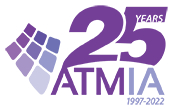ATMIA Launches Nationwide Effort to Help Consumers Recognize Typical Cryptocurrency Fraud Schemes
ATMIA Launches Nationwide Effort to Help Consumers Recognize Typical Cryptocurrency Fraud Schemes
SIOUX FALLS, S.D.--(BUSINESS WIRE)--As part of a nationwide effort to educate and inform both law enforcement and consumers, the ATM Industry Association (ATMIA) today announced the release of a handout addressing cryptocurrency fraud schemes. The two-page document includes brief descriptions of six different types of fraud schemes and recommendations for law enforcement best practices when a crypto ATM scam is suspected.
Although the vast majority (about 99%) of cryptocurrency transactions represent legitimate activity, some consumers are falling victim to clever scam artists. People who would never hand over a blank check or their credit card to a stranger, are tricked into completing a cryptocurrency transaction for one. And these tend to be the type of romance, investment, and merchandise scams that have been around for decades.
Cryptocurrency ATMs are a rapidly growing segment of the self-service market. But they are also a rather new segment of the market, subject to often confusing and inconsistent regulatory regimes. In response to the current environment, ATMIA created the ATM Cryptocurrency Deployers Advocacy Group to work towards reasonable regulation within a single federal agency. It is this group that recognized the need for consumer education and has produced the content released today.
ATMIA CEO Mike Lee noted, “The co-existence between cash, crypto, digital currencies and ATMs has already been established. But as an industry body, it is incumbent upon us to self-regulate at all times and do everything we can to ensure transactions are safe and legitimate, working with law enforcement to tackle all types of criminal attack.”
This new ATMIA resource, which includes a list of six typical cryptocurrency fraud schemes, as well as suggested law enforcement best practices, is available for download from the ATMIA website. Fraudsters are more than happy to guide their victims through a process that puts cryptocurrency in their pockets. Educating consumers about what to look for and what to be suspicious about when making a crypto transaction, will go a long way toward reducing the level of fraud even further.
Contacts
David N. Tente
david.tente@atmia.com
1.407.833.7906
